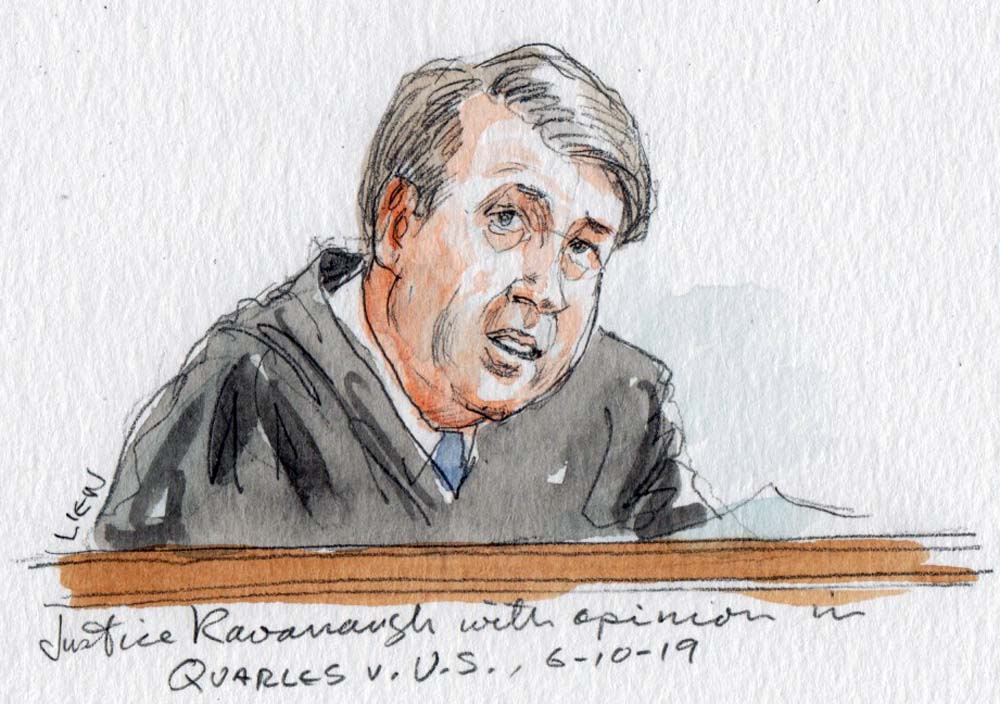Opinion analysis: A straightforward definition of burglary for ACCA

on Jun 10, 2019 at 7:05 pm

In a unanimous 10-page opinion this morning, Justice Brett Kavanaugh answered for the Supreme Court what he described as “an exceedingly narrow question” and affirmed a prosecution-friendly definition of “burglary” as used in the Armed Career Criminal Act (18 U.S.C. §924(e)). In a brief concurrence, Justice Clarence Thomas repeated his long-standing view that the court “should consider whether its [“categorical”] approach is actually required … for ACCA’s enumerated offenses.” But the court was plainly not interested in using this case to examine that or any other more complicated questions of statutory construction. “Under this Court’s precedents,” the categorical ACCA definition of burglary in Section 924(e) includes, if state law permits it, any unlawful “remaining in” presence in a building or structure “when the defendant forms the intent to commit a crime at any time” (emphasized twice in the opinion).
Background and Quarles’ “esoteric” argument
As previewed, Jamar Quarles was previously convicted under a Michigan “burglary” statute that encompasses not just common-law offenders (those who, in Blackstone’s conception repeated today, “break and enter a dwelling at night with the intent to commit a felony”), but also anyone who “enters a dwelling without permission and, at any time while he or she is … present in … the dwelling, commits a misdemeanor.” A majority of states have similarly broadened the common-law definition of burglary to include such “remaining in” offenses. Meanwhile, the ACCA requires enhanced imprisonment terms for federal “felon-in-possession” offenders who have three prior convictions for various felonies including “burglary.” The question presented in this case was whether a “remaining in” burglary conviction fits within the “categorical” definition of burglary that the Supreme Court adopted in Taylor v. United States back in 1990.
To account for the many variations in state criminal law statutes, Taylor adopted a “generic” definition of burglary for federal purposes: “unlawful or unprivileged entry in, or remaining in, a building or structure, with intent to commit a crime.” The Supreme Court explained then that “so long as the state law in question ‘substantially corresponds’ to (or is narrower than) generic burglary, the conviction qualifies.” Moreover, said Taylor, a “categorical” approach, which examines all possible applications of the state criminal statute, rather than the actual facts of any particular prior conviction, must be used.
Because Taylor embraced a “remaining in” burglary definition, Quarles’ prior Michigan “remaining in” conviction might seem to qualify easily as a burglary under ACCA. Indeed, the U.S. Court of Appeals for the 6th Circuit had found that it did. But Quarles presented a more intricate (or as Kavanaugh described it, “esoteric”) distinction: Must the intent to commit a crime while unlawfully remaining in a structure exist “at the exact moment when he or she first unlawfully remains” or, as the Michigan statute says “at any time”? Quarles argued that the prior, narrower definition should apply for Taylor purposes, because (a) the common-law definition of burglary had used an exact “time of entry” intent requirement, and (b) in 1986, when Congress enacted Section §924(e), only five states had clearly adopted a broader “at any time” definition. The Taylor court said that it intended to adopt a burglary definition that “most states” used at that time, and five states is far from a majority. So Quarles argued that the subsequent adoption of a broader “at any time” intent requirement should be held to go beyond Taylor’s generic definition.
Today’s opinion: “remaining in” means “at any time” during the remaining
Today’s unanimous court made quick work of rejecting Quarles’ position. First, wrote Kavanaugh, “[i]n ordinary usage, ‘remaining in’ refers to a continuous activity” — the Supreme Court “has followed that ordinary meaning in analogous legal contexts.” Moreover, a majority of state burglary statutes in 1986 did encompass the “remaining in” concept, and “all [five] of the state appellate courts that had definitively addressed th[e timing] issue as of 1986 had” adopted the “at any time” position. Finally, excluding such burglaries from ACCA “would make little sense” and would “defeat Congress’ stated objective” of requiring enhanced imprisonment terms for repeat “armed career criminals.” “The possibility of a violent confrontation does not depend on the exact moment” that criminal intent is formed, and “we should not lightly conclude that Congress enacted a self-defeating statute.” It was “not likely” that, when directing that repeat burglars be imprisoned, Congress intended to include only some “remaining in” burglars while excluding others.
An aside: as we first-year criminal law professors routinely note, the common-law definition of burglary turned precisely on such an “esoteric” distinction: At common-law, felonious intent had to be present at the moment of entry or the breaking and entering was not “burglary.” The Supreme Court’s only reference to this point was oblique: Kavanaugh noted that “by the time Congress passed” ACCA, “burglary statutes had long since departed from the common-law formulation.” (Kavanaugh’s 10-page opinion also noted, at the end, that the court was not addressing other arguments that Quarles presented but “did not preserve.”)
“To sum up,” the opinion concludes, the “same sources” examined in Taylor lead to the conclusion today that criminal intent that arises “at any time” while unlawfully remaining in a structure falls within the range of ACCA’s enhanced sentencing requirement.
Conclusion
Quarles is the third ACCA opinion issued by the Supreme Court this term (U.S. v. Stitt and Stokeling v. U.S. are the other two.). All three have rejected the defendant’s arguments. And most of the justices appear to be no longer interested in revisiting the “categorical” approach, even as Thomas repeats his criticism that cases like Quarles “demonstrate[] [its] absurdity.” (Certainly Thomas is correct that Quarles’ “esoteric” intent argument is “starkly different from the reality” of the violent and unsavory individual facts of Quarles’ present and prior convictions – facts which, relevant or not, Kavanaugh’s brief opinion took time to describe.)
As I have previously noted, Justice Elena Kagan has referred, at prior ACCA arguments this term, to proposed federal legislation that would revise ACCA. But with the government winning all three ACCA cases this term, prospects for a majority of both houses of Congress perceiving a pressing need for legislative action seem dim. Today’s unremarkable and unanimous opinion suggests that the justices similarly have lost interest. Lower federal courts will undoubtedly continue to struggle with many “esoteric” details of Taylor’s categorical approach to ACCA. But for now, the Supreme Court seems content to leave that struggle below, while sending lower courts a general message that “ordinary meaning” and “common sense” should control.



